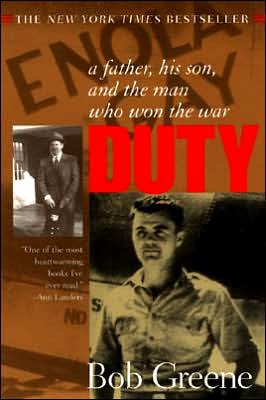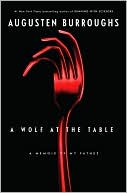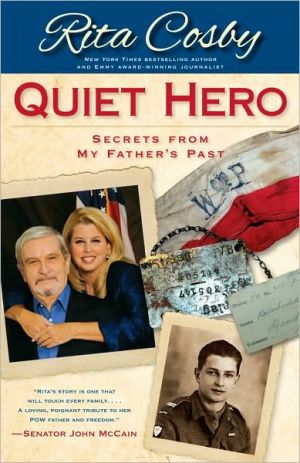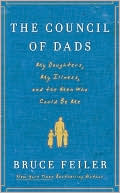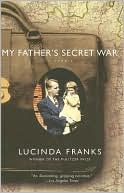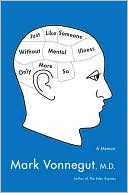Duty: A Father, His Son, and the Man Who Won the War
When Bob Greene went home to central Ohio to be with his dying father, it set off a chain of events that led him to knowing his dad in a way he never had before—thanks to a quiet man who lived just a few miles away, a man who had changed the history of the world.\ Greene's father—a soldier with an infantry division in World War II—often spoke of seeing the man around town. All but anonymous even in his own city, carefully maintaining his privacy, this man, Greene's father would point out to...
Search in google:
When Bob Greene went home to central Ohio to be with his dying father, it set off a chain of events that led him to knowing his dad in a way he never had before, thanks to a quiet man who lived just a few miles away and changed the history of the world. In 1945, Paul Tibbets had piloted a plane called Enola Gay to the Japanese city of Hiroshima, where he dropped the atomic bomb. On the morning after the last meal Greene ever ate with his father, he went to meet Tibbets. What developed was an unexpected friendship that allowed Greene to discover things about his father, and his father's generation of soldiers, that he had never fully understood before.About the Author:Bob Greene is a syndicated columnist for the Chicago Tribune and a columnist for Life magazine. His reports and commentary appear in more than 200 newspapers in the United States, Canada, and Japan. For nine years is "American Beat" was the lead column in Esquire, and as a broadcast journalist he has served as contributing correcpondent for "ABC News Nightline." His bestselling books include Be True to Your School, Good Morning, Merry Sunshine, and with his sister, D. G. Fulford, To Our Children's Children: Preserving Family Histories for Generations to Come. He lives in Chicago, IL. Time - R. Z. Sheppard In Duty, Bob Greene goes back to Columbus to see his dying father, a highly decorated World War II infantry officer. In an effort to understand his dad and the men of his generation, Greene persuades is hometown's most renowned veteran, Tibbets to finally break his silence. This book is remarkable not only for the scorching accounts of war but also because the book was written by a son desperate to know father who never talked about the most intense experiences of his lives.
Chapter One\ \ \ The morning after the last meal I ever ate with my father, I finally met the man who won the war.\ It was from my father that I had first heard about the man. The event — the dropping of the atomic bomb on Hiroshima — I of course knew about; like all children of the post-World War II generation, my classmates and I had learned about it in elementary school.\ But the fact that the man who dropped the bomb — the pilot who flew the Enola Gay to Japan, who carried out the single most violent act in the history of mankind and thus brought World War II to an end — the fact that he lived quietly in the same town where I had grown up...that piece of knowledge came from my father.\ It was never stated in an especially dramatic way. My dad would come home from work — from downtown Columbus, in central Ohio — and say: "I was buying some shirts today, and Paul Tibbets was in the next aisle, buying ties."\ They never met; my father never said a word to him. I sensed that my father might have been a little reluctant, maybe even a touch embarrassed; he had been a soldier with an infantry division, Tibbets had been a combat pilot, all these years had passed since the war and now here they both were, two all-but-anonymous businessmen in a sedate, landlocked town in a country at peace...what was my dad supposed to say? How was he supposed to begin the conversation?\ Yet there was always a certain sound in his voice at the dinner table. "Paul Tibbets was in the next aisle buying ties...." The sound in my dad's voice told me — as if I needed reminding — that the story of his life had reached itsmost indelible and meaningful moments in the years of the war, the years before I was born.\ Those dinner-table conversations were long ago, though; they were in the years when my dad was still vital, in good health, in the prime of his adult years, not yet ready to leave the world. I had all but forgotten the conversations — at least the specifics of them, other than the occasional mentions of Tibbets.\ Now my dad was dying. We had dinner in his bedroom — he would not, it would turn out, again be able to sit in a chair and eat after this night — and the next morning I told him that I had somewhere to go and that I would be back in a few hours, and I went to find Paul Tibbets. Something told me that it was important.
\ From Barnes & NobleWhen bestselling author Bob Greene went home to be with his ailing father in 1998, he began a compelling relationship with Colonel Paul Tibbets, the man who piloted the Enola Gay, the B-29 that dropped the A-bomb on Hiroshima. Greene tells of Tibbets's training for and execution of that vital military mission, at the same time more fully understanding his own father's role as part of the "Greatest Generation."\ \ \ \ \ R. Z. SheppardIn Duty, Bob Greene goes back to Columbus to see his dying father, a highly decorated World War II infantry officer. In an effort to understand his dad and the men of his generation, Greene persuades is hometown's most renowned veteran, Tibbets to finally break his silence. This book is remarkable not only for the scorching accounts of war but also because the book was written by a son desperate to know father who never talked about the most intense experiences of his lives. \ — Time\ \ \ New York Times Book Review"[Greene] delineates one of the most significant cultural divides in America—between the deeply dutiful World War II generation and its more cynical and radically individualistic descendants.\ \ \ \ \ Rocky Mountain NewsA personal odyssey...a touching look at the differences between generations and the many actions—large and small—that define us.\ \ \ \ \ Publishers WeeklyRiding the same wave of nostalgia and admiration that Tom Brokaw surfed in his acclaimed The Greatest Generation (1998), Chicago Tribune columnist Greene (Chevrolet Summers, Dairy Queen Nights) delivers a heartfelt tribute to his father's generation in this triangulated memoir. Called back to his hometown (Columbus, Ohio) to say good-bye to his dying father, Greene decides to seek out his father's longtime hero--an 83-year-old fellow WWII vet and Ohioan named Paul Tibbets. Tibbets was the man who, as a 29-year-old lieutenant colonel, piloted the Enola Gay, the plane that dropped the atomic bomb on Hiroshima. Combining excerpts from his father's wartime journals, interviews with Tibbets and his own personal recollections, Greene pays homage to the ideals of his father and conveys successfully what WWII meant to men of that generation. Meanwhile, through his conversations with Tibbets, Greene comes to better understand his late father. Like the aging pilot, Greene realizes, his father felt that the freedoms these men had fought for in the war are unappreciated by today's younger generations, and, like Tibbets, his father was angry about postwar cultural changes. Regrettably, what is occasionally a touching salute by a grieving son is marred by credulousness and overly dramatic prose. Greene's admiration and respect for the pilot of the Enola Gay even manages to get in the way of his well-honed investigative skills-- for example, he accepts with little follow-up Tibbets's assertion that he never had any regrets whatsoever about dropping the bomb. And Greene's relentlessly uncritical depictions of Tibbets's seemingly unreflective, unemotional and gruff persona--as well as his nostalgia for traditional values--wears thin. (June) Copyright 2000 Cahners Business Information.\|\ \ \ \ \ Library JournalAccording to Greene (Be True to Your School), the man who won World War II was Col. Paul Tibbets, pilot of the Enola Gay--the B-29 bomber that dropped the atomic bomb on Hiroshima, Japan in August 1945. Greene, a syndicated columnist for the Chicago Tribune, has created a powerful and poignant tale of his personal relationship with Tibbets from their first meeting in 1998. With the skill and sensitivity of an accomplished journalist, Greene tells of Tibbets's involvement with the planning, training for, and execution of that fateful flight to commit the most violent act in history. More importantly, Greene relates how Tibbets and the surviving members of the aircrew have adjusted to their unwanted notoriety in peacetime. In addition, this book is a heart-wrenching story of Greene's relationship with his dying father, also a World War II veteran. Through Tibbets (who lived near Greene's father), Greene finally comes to understand how his father and the World War II generation came to embrace the true meanings of patriotism, courage, and duty. Strongly recommended for all public libraries. [Previewed in Prepub Alert, LJ 2/15/00.]--William D. Bushnell, formerly with USMC, Sebascodegan Island, ME Copyright 2000 Cahners Business Information.\\\ \ \ \ \ Kirkus ReviewsChicago Sun-Times columnist Greene's (The 50-Yard Dash, 1997) memoir is touched off by the death of his father in central Ohio, in the same town where Colonel Paul Tibbets (the "man who won the war") also lived. Tibbets was the pilot of the bomber that dropped the first atomic bomb on Hiroshima in 1945. Greene's father, an ordinary soldier in WWII, would point out Tibbets in town but would never speak to him, and it was clear to young Greene that his father held the former airman in a certain amount of awe—for the manner in which he carried out his mission without question, and almost without flaw (Tibbets reached his target only 17 seconds late, after a journey of thousands of miles in a crude B-29 bomber). After Greene's father died, Greene sought out Tibbets and began a series of conversations on the war and its impact on his generation. While Greene writes well, the degree of sentimentality he brings to his subject is almost embarrassing, and his device of moving between his father's reminiscence of the war and his own accounts of meetings with Tibbets and others (such as a reunion of the famed "Doolittle's Raiders," who bombed the Japanese home islands in retaliation for the attack on Pearl Harbor) constantly distracts from the flow of the book. A dull and sentimental read.\ \
